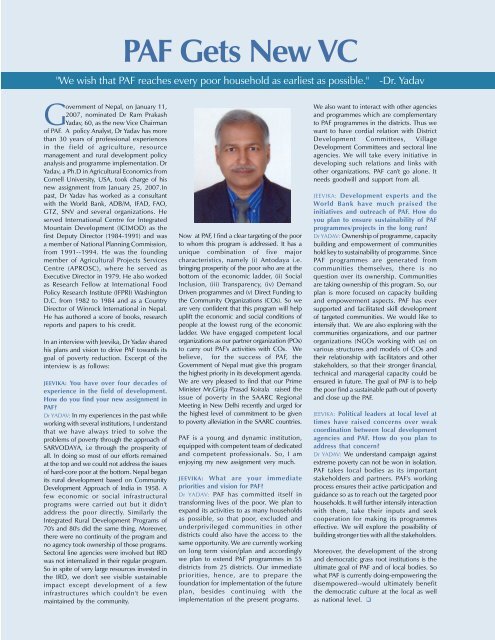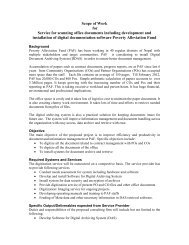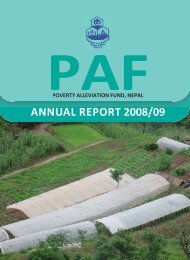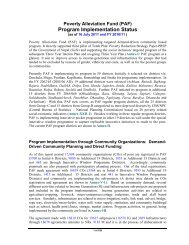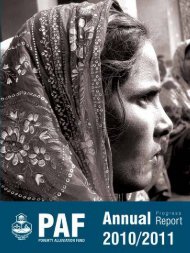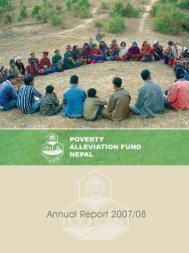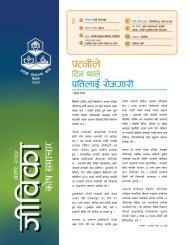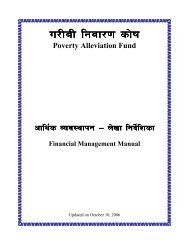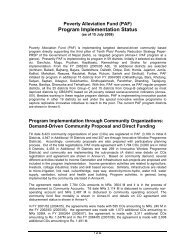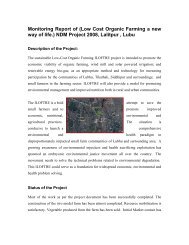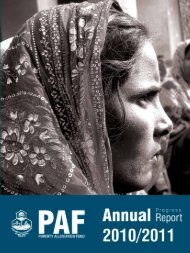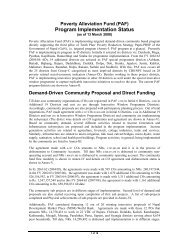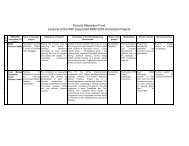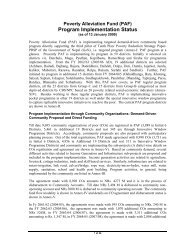Jeevika - VOL 1, NUMBER 2, MARCH 2007 - Poverty Alleviation ...
Jeevika - VOL 1, NUMBER 2, MARCH 2007 - Poverty Alleviation ...
Jeevika - VOL 1, NUMBER 2, MARCH 2007 - Poverty Alleviation ...
You also want an ePaper? Increase the reach of your titles
YUMPU automatically turns print PDFs into web optimized ePapers that Google loves.
PAF Gets New VC"We wish that PAF reaches every poor household as earliest as possible."-Dr. YadavGovernment of Nepal, on January 11,<strong>2007</strong>, nominated Dr Ram PrakashYadav, 60, as the new Vice Chairmanof PAF. A policy Analyst, Dr Yadav has morethan 30 years of professional experiencesin the field of agriculture, resourcemanagement and rural development policyanalysis and programme implementation. DrYadav, a Ph.D in Agricultural Economics fromCornell University, USA, took charge of hisnew assignment from January 25, <strong>2007</strong>.Inpast, Dr Yadav has worked as a consultantwith the World Bank, ADB/M, IFAD, FAO,GTZ, SNV and several organizations. Heserved International Centre for IntegratedMountain Development (ICIMOD) as thefirst Deputy Director (1984-1991) and wasa member of National Planning Commission,from 1991--1994. He was the foundingmember of Agricultural Projects ServicesCentre (APROSC), where he served asExecutive Director in 1979. He also workedas Research Fellow at International FoodPolicy Research Institute (IFPRI) WashingtonD.C. from 1982 to 1984 and as a CountryDirector of Winrock International in Nepal.He has authored a score of books, researchreports and papers to his credit.In an interview with <strong>Jeevika</strong>, Dr Yadav sharedhis plans and vision to drive PAF towards itsgoal of poverty reduction. Excerpt of theinterview is as follows:JEEVIKA: You have over four decades ofexperience in the field of development.How do you find your new assignment inPAF?Dr YADAV: In my experiences in the past whileworking with several institutions, I understandthat we have always tried to solve theproblems of poverty through the approach ofSARVODAYA, i.e through the prosperity ofall. In doing so most of our efforts remainedat the top and we could not address the issuesof hard-core poor at the bottom. Nepal beganits rural development based on CommunityDevelopment Approach of India in 1958. Afew economic or social infrastructuralprograms were carried out but it didn'taddress the poor directly. Similarly theIntegrated Rural Development Programs of70's and 80's did the same thing. Moreover,there were no continuity of the program andno agency took ownership of those programs.Sectoral line agencies were involved but IRDwas not internalized in their regular program.So in spite of very large resources invested inthe IRD, we don't see visible sustainableimpact except development of a fewinfrastructures which couldn't be evenmaintained by the community.Now at PAF, I find a clear targeting of the poorto whom this program is addressed. It has aunique combination of five majorcharacteristics, namely (i) Antodaya i.e.bringing prosperity of the poor who are at thebottom of the economic ladder, (ii) SocialInclusion, (iii) Transparency, (iv) DemandDriven programmes and (v) Direct Funding tothe Community Organizations (COs). So weare very confident that this program will helpuplift the economic and social conditions ofpeople at the lowest rung of the economicladder. We have engaged competent localorganizations as our partner organization (POs)to carry out PAF's activities with COs. Webelieve, for the success of PAF, theGovernment of Nepal must give this programthe highest priority in its development agenda.We are very pleased to find that our PrimeMinister Mr.Girija Prasad Koirala raised theissue of poverty in the SAARC RegionalMeeting in New Delhi recently and urged forthe highest level of commitment to be givento poverty alleviation in the SAARC countries.PAF is a young and dynamic institution,equipped with competent team of dedicatedand competent professionals. So, I amenjoying my new assignment very much.JEEVIKA: What are your immediatepriorities and vision for PAF?Dr YADAV: PAF has committed itself intransforming lives of the poor. We plan toexpand its activities to as many householdsas possible, so that poor, excluded andunderprivileged communities in otherdistricts could also have the access to thesame opportunity. We are currently workingon long term vision/plan and accordinglywe plan to extend PAF programmes in 55districts from 25 districts. Our immediatepriorities, hence, are to prepare thefoundation for implementation of the futureplan, besides continuing with theimplementation of the present programs.We also want to interact with other agenciesand programmes which are complementaryto PAF programmes in the districts. Thus wewant to have cordial relation with DistrictDevelopment Committees, VillageDevelopment Committees and sectoral lineagencies. We will take every initiative indeveloping such relations and links withother organizations. PAF can't go alone. Itneeds goodwill and support from all.JEEVIKA: Development experts and theWorld Bank have much praised theinitiatives and outreach of PAF. How doyou plan to ensure sustainability of PAFprogrammes/projects in the long run?Dr YADAV: Ownership of programme, capacitybuilding and empowerment of communitieshold key to sustainability of programme. SincePAF programmes are generated fromcommunities themselves, there is noquestion over its ownership. Communitiesare taking ownership of this program. So, ourplan is more focused on capacity buildingand empowerment aspects. PAF has eversupported and facilitated skill developmentof targeted communities. We would like tointensify that. We are also exploring with thecommunities organizations, and our partnerorganizations (NGOs working with us) onvarious structures and models of COs andtheir relationship with facilitators and otherstakeholders, so that their stronger financial,technical and managerial capacity could beensured in future. The goal of PAF is to helpthe poor find a sustainable path out of povertyand close up the PAF.JEEVIKA: Political leaders at local level attimes have raised concerns over weakcoordination between local developmentagencies and PAF. How do you plan toaddress that concern?Dr YADAV: We understand campaign againstextreme poverty can not be won in isolation.PAF takes local bodies as its importantstakeholders and partners. PAF's workingprocess ensures their active participation andguidance so as to reach out the targeted poorhouseholds. It will further intensify interactionwith them, take their inputs and seekcooperation for making its programmeseffective. We will explore the possibility ofbuilding stronger ties with all the stakeholders.Moreover, the development of the strongand democratic grass root institutions is theultimate goal of PAF and of local bodies. Sowhat PAF is currently doing-empowering thedisempowered--would ultimately benefitthe democratic culture at the local as wellas national level. !3


